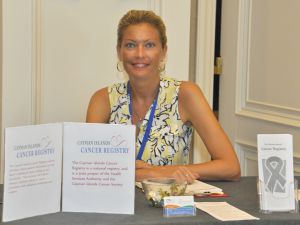(CNS Local Life): As part of National Cancer Research Month, which is marked in May, the Health Services Authority (HSA) is working to raise awareness of the importance of high-quality, innovative cancer research to the Cayman Islands and the world. Towards this end, Cancer registrar Amanda Nicholson has called on the public to support this cause.
“There are many ways people can show support for National Cancer Research Month, such as calling on government and health officials to make cancer research and prevention a top priority, or looking for volunteer opportunities at local organisations committed to cancer research,” she said in an HSA press release.
Despite substantial progress being made, the growth of cancer continues to be a global challenge. The immense toll of the disease is felt through the number of lives it affects each year and its significant economic impact, said the HSA in the release, noting, “However, by working together through cancer research, we can defeat cancer.”
When a person is diagnosed with cancer in the UK, information about them is automatically included in their national cancer registry. This is not the case in the Cayman Islands where cancer patients have to voluntarily register themselves.
“One of the main concerns among people in Cayman causing their hesitation to register is the fear that information about their health may get into the wrong hands,” Nicholson said.
“However, due to the sensitivity of health information, it has to be kept under the highest levels of safety, security and confidentiality. The cancer registry is held on a secure computer database with tightly controlled and restricted access.”
The data held in cancer registries is at the heart of efforts to improve cancer survival, treatment and care. A cancer registry can show how many people are diagnosed with cancer at a national level, what treatments they have, how long they live and, most importantly, whether management of the disease is getting better or worse.
This information can then be used to help find out potential causes of cancer, plan cancer services, develop more effective treatments and identify where further progress is needed to improve the lives of all people affected by the disease.
Nicholson pointed out a few statistics from the data the registry has gathered thus far. “For the past few years we have seen a very slow, but steady, increase in the number of people registering,” she said. “Registration rates for 2017 were 37 percent higher than those for 2016. We now have nearly 400 registrants in our database. Presently, 31 percent of these registrants are male and 69 percent are female.
“The most commonly reported cancer to date is breast cancer, which comprises approximately 38 percent of reported cases. Sixteen percent of breast cancer cases reported to the registry were diagnosed in women under the age of 40.”
The cancer registry has had many supporters from cancer survivors such as Veronica Seales to healthcare professionals such as Dr Sook Yin, who have both advocated how important the registry is in moving Cayman forward in the global fight against the disease.
Registration involves filling out a one-page form which collects basic information about cancer diagnosis. This form is available at the office of the registrar at the HSA, or through the websites of the HSA or the Cayman Islands Cancer Society
Anyone who is considering registering can contact Amanda Nicholson by phone at 244-2560 or by email


